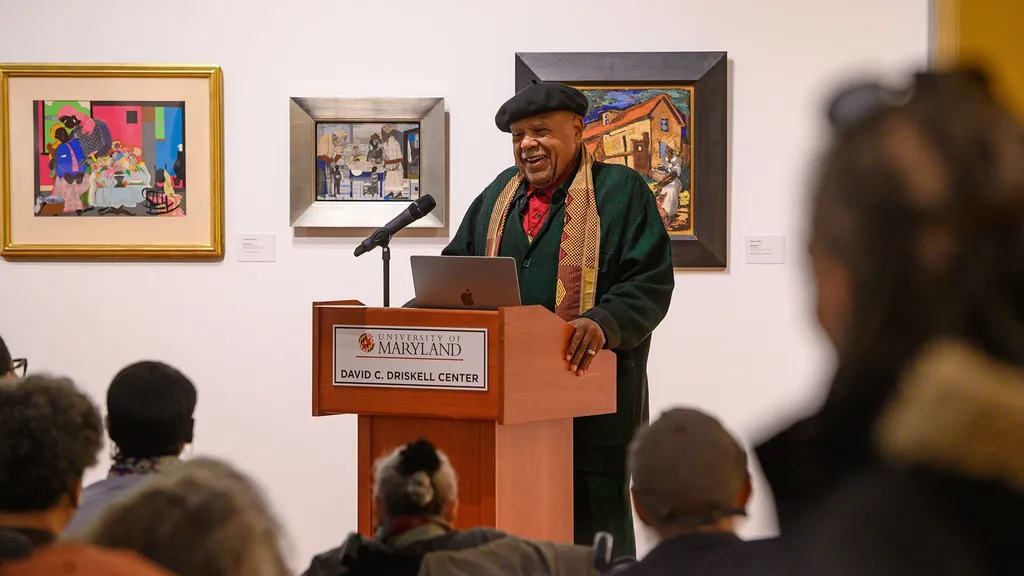- April 05, 2024
- By Maggie Haslam
A University of Maryland center that has long celebrated African American art inside its walls has now expanded outdoors, with the unveiling Thursday of a massive abstract sculpture of stainless steel disks, buttressed by curved legs and encumbered with a massive chain.
“David’s Dream,” a new composition by contemporary artist Melvin Edwards, was dedicated in front of the David C. Driskell Center to an audience of campus administrators, faculty, staff and friends. Standing over 20 feet tall, it commemorates the late Distinguished University Professor Emeritus, groundbreaking artist and center namesake, and his mission to highlight the rich legacy of African American artists.
“There are few sculptures by African American artists on public university campuses in the United States,” said center Director and Professor Jordana Saggese. “I’m so pleased to honor Mel’s contribution to the Driskell Center and the University of Maryland campus and grateful to gather in celebration of the power of creativity in shaping our cultural landscape.”
The prominently located sculpture was funded by a $790,000 grant from the Andrew W. Mellon Foundation, bolstering UMD’s commitment to advance Driskell’s work by providing a home for African American art, artists and scholars.
“Upon the completion of the Purple Line, one of the first things people will see when they arrive on campus is this sculpture,” Craig Kier, director of UMD’s Arts for All initiative, referencing the state’s light-rail line now under construction. “It creates a stunning welcoming point to the University of Maryland and will highlight the important work happening at the Driskell Center.”

A practitioner of abstract and often minimalist sculpture, Edwards is known for his portrayal of race, labor and violence, as well as themes of the African diaspora, often through industrial and agricultural metalworks. His work has been displayed globally in museums, universities and public housing projects.
Edwards became acquainted with Driskell through fellow artist William T. Williams; while separated geographically, their paths crossed often in professional and personal circles.
“David was a part of things and a man of broad interest, not just in visual art but in the concepts of being a thoughtful and educated human being,” he said in an interview during the sculpture’s installation in February. “His focus was on culture, but he was humanistic; he was making an extra effort to put people and things together.”
The Driskell Center commissioned Edwards in 2021, and he and his team developed and fabricated the metalwork over the next three years. It will serve as the centerpiece of a garden dedicated to Driskell, an avid gardener who often depicted pine trees and landscapes; construction will begin after the Purple Line is completed.
While the piece is site-specific and intentional, Edwards said the reality of public art is that its unfamiliarity spurs different interpretations and meanings.
“You don’t know what life it will have until it does,” said Edwards. “And I wasn’t trying to anticipate either. I was trying to make a good piece of sculpture that would speak something to David’s memory. But as a public piece, it may hold someone else’s memories that have nothing to do with your motive.”
Driskell, who died in 2020, was a mixed media and printmaking artist whose works included his pioneering curated exhibition, “Two Centuries of Black American Art: 1750-1950.” He joined the University of Maryland in 1977; as a scholar, he was a leading authority on African American art and earned multiple fellowships, awards and honorary degrees, including three Rockefeller Foundation fellowships and the National Humanities Medal.
The Driskell Center was established in 2001 as a venue for showcasing African American artists, as well as Driskell’s collection of letters, photos, notes and catalogs. The center’s current exhibition, “Driskell & Friends: Creativity, Collaboration and Friendship,” features 70 pieces by 35 prominent African American artists, including a piece from Edwards’ “The Lynch Fragments.” It runs through May 24.
Topics
Arts & CultureTags
Arts